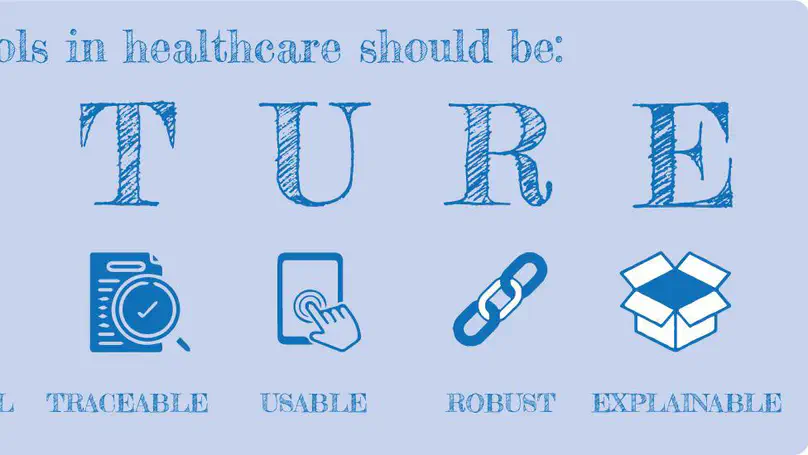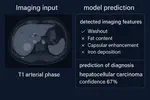Martijn P. A. Starmans
Assistant Professor & PI Artificial Intelligence for Integrated Diagnostics (AIID) focused on Medical Imaging in Oncology
Erasmus Medical Center, Department of Radiology & Nuclear Medicine
Erasmus Medical Center, Department of Pathology
Biography
Dr. ir. Martijn Starmans is Assistant Professor at the Erasmus MC (Rotterdam, the Netherlands) leading the AI for Integrated Diagnostics (AIID) research line, with a dual appointment at the Dept. of Radiology & Nuclear Medicine (BIGR group) and Dept. of Pathology (PHANTOM group). His vision is that we can and should learn more from previous studies, which he pursues by working on meta-level methods across clinical applications. His main research interest is the use of AI to improve the diagnostic work-up in oncology through integrated diagnostics, focussed on radiology (“radiomics”) and pathology (“pathomics”). Specifically, his group develops multi-modal machine learning methods to simultanously co-learn from both modalities (“radiopathomics”), and automated machine learning and meta-learning methods to generalize these methods across clinial applications. To establish his research line, Martijn received a prestigious 2M Euro NGF AINed Personal Fellowship in 2024. Martijn actively collaborates with of the BCN-AIM lab of prof. Lekadir at the University of Barcelona, with whom he created the FUTURE-AI guideline for trustworthy AI. He works on a variety of clinical applications (e.g. sarcoma, liver cancer, colorectal cancer, bladder cancer, melanoma, neuroendocrine tumors).
Collaborations & Consortia Martijn is co-founder and co-lead of the MICCAI Open Data initiative, which promotes and facilitates sharing of medical imaging data. This effort started at the MICCAI 2024 conference, and continued at MICCAI 2025 and MICCAI 2026, where he was part of the organizing committe as one of the Open Data chairs. The Open Data event is part of the main MICCAI conference and has includes a selection of oral presentations from the accepted Open Data papers, keynote speakers, and panel discussion on collaboratively building Open Data standards. With a focus on underrepresented diseases and populations, he established the AFRICAI repository repository for the 2024 edition to host the accepted datasets. Martijn was also one of the initial board members of the AFRICAI MICCAI SIG.
Martijn is one of the initiators and PIs of the Sarcoma Artificial Intelligence (SAI) consortium (grant awarded), the Liver AI (LAI) consortium (grant awarded), and project lead of the Colorectal Liver Metastes AI (COLIMA) consortium (grant submitted). In these consortia, in total 51 clinical centers, companies, professional- and patient associations from 18 countries are united. He is also part of the Trustworthy AI for MRI ICAI LAB.
Martijn has a strong affinity with research infrastructure, which besides the MICCAI Open Data initiatives he pursues in various large European Horizon projects. He is work package leader of AFRICAI-RI: A Pan-African Research Infrastructure for Collaborative Biomedical Imaging and Artificial Intelligence in Respiratory Care, is was work package leader of EuCanImage: Towards a European cancer imaging platform for enhanced Artificial Intelligence in oncology, and EOSC4Cancer: A European-wide foundation to accelerate Data-driven Cancer Research. Additionally, he is external advisor of RadioVal, and member of EUCAIM.
For a better overview on his projects, see his BIGR home page: https://bigr.nl/member/martijn/.
PhD Degree
Martijn obtained his PhD degree ‘‘cum laude’’ on February 1 2022 with his thesis titled Streamlined Quantitative Imaging Biomarker Development: Generalization of radiomics through automated machine learning. Following his passion to efficiently and automatically optimize routines, he developed an adaptive radiomics framework using automated machine learning, described in this paper. He collaborated with a large number of clinicians to develop radiomics biomarkers in a wide variety of clinical applications. His thesis was nominated for the Fredrik Philipsprijs 2023 for Best Dutch Radiology Thesis and made the top five.
Download my PhD Thesis.
Educational activities
Martijn has co-founded two courses and was teaching three courses in total in the BSc and MSc Technical Medicine. He is currently teaching one course in the MSc Applied Physics of the TU Delft. Martijn also was part of the program committee and mentor in the first AFRICAI Summer School, and part of the first Rotterdam Radiology AI course organized by the Dutch Radiology Society. He enjoys working together with students and has so-far (co-)supervised 53 students in interships and thesis projects.
Download my (slightly outdated) resumé / CV .
- Radiomics
- Pathomics
- RadioPathomics
- Multimodal machine learning
- AutoML
- Meta-Learning
- Oncology
- Soft-tissue tumors / sarcoma
- Liver cancer
- Colorectal liver metastases
-
PhD ''Streamlined Quantitative Imaging Biomarker Development'' ("cum laude"), 2022
Erasmus Medical Center, Rotterdam, the Netherlands
-
MSc Applied Physics, 2016
Delft University of Technology, Delft, the Netherlands
-
BSc Applied Physics, 2013
Delft University of Technology, Delft, the Netherlands
Awards & Grants
- Role: Co-PI
- Topic: AFRICAI-RI: A Pan-African Research Infrastructure for Collaborative Biomedical Imaging and Artificial Intelligence
- Total funding: 5M Euro.
- Role: Co-PI
- Topic: Detecting Complex Regional Pain Syndrome and quantifying treatment success using a trustworthy artificial intelligence model based on video thermography
- Total funding: 16k Euro.
- Role: Co-PI
- Topic: Trustworthy and explainable AI models for differentiating benign and malignant bone tumors on radiological imaging
- Total funding: 14k Euro.
- Role: Main applicant
- Topic: Radiology and pathology join forces through Artificial Intelligence for Integrated Diagnostics (AIID)
- Total funding: 2M Euro.
- Role: Participant
- Topic: PATH2XNAT: COVID 19 meets Pathomics meets XNAT
- Total funding: 280k Euro.
- Role: Co-PI*
- Topic: The Liver Artificial Intelligence (LAI) consortium: a benchmark dataset and optimized machine learning methods for MRI-based diagnosis of solid appearing liver lesions
- Total funding: 1M Euro.
*Not officially mentioned as Co-PI due to formalities. Reference of formal applicant available upon request.
- Role: Co-PI
- Topic: An artificial intelligence (AI)-based model for detection of incidental pulmonary embolism in chest CTs
- Total funding: 1M Euro.
- Role: Co-applicant
- Topic: EUCAIM: European Federation for Cancer Images
- Total funding: 33M Euro.
- Role: Co-PI*
- Topic: Automatic grading and phenotyping of soft-tissue tumors through machine learning to guide personalized cancer treatment
- Total funding: 400k Euro.
*Not officially mentioned as Co-PI due to formalities. Reference of formal applicant available upon request.
Featured Publications
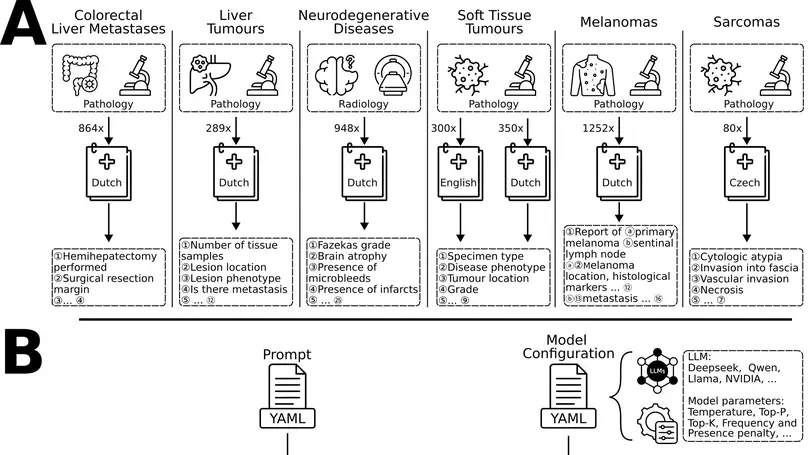
Great study to systematically benchmark various LLMs and prompting strategies to extract structured information from radiological and pathological reports across six use cases and multiple languages. These findings show that open-weight LLMs can extract structured data from clinical reports across diseases, languages, and institutions, offering a scalable approach for clinical data curation.
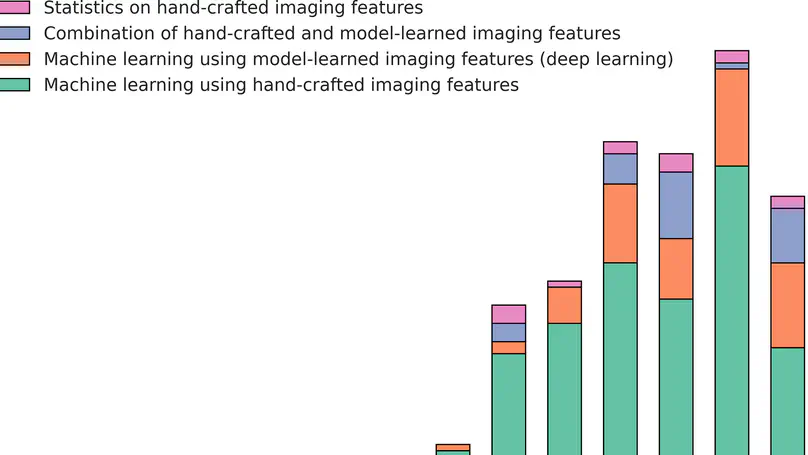
Tremendous effort of our sarcoma PhD team to review over 300 (!) papers on AI for STBT, indicating substantial gaps towards implementation in clinical practice and insights how to get there!
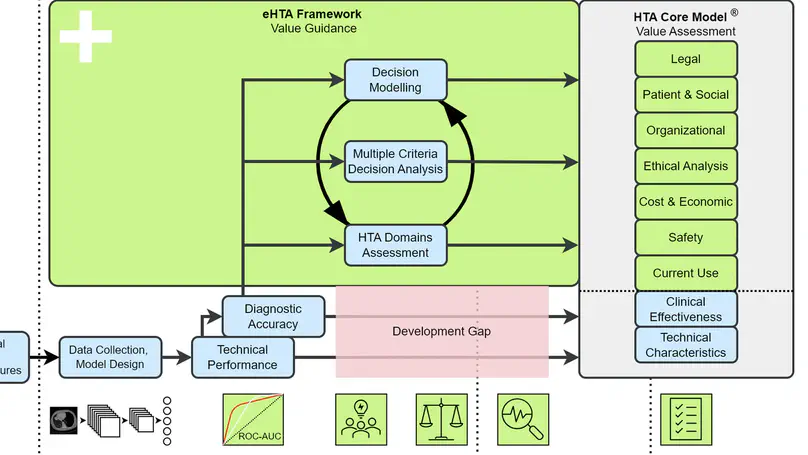
Very proud of the first paper of PhD candidate Erik Kemper! This paper advocates for value-based development of AI tools in radiology, emphasizing that their limited clinical adoption stems from issues of usefulness and trust. By incorporating early health technology assessments (HTA) into the AI tool lifecycle, this study shows how a systematic evaluation can enhance clinical relevance and facilitate adoption into practice.
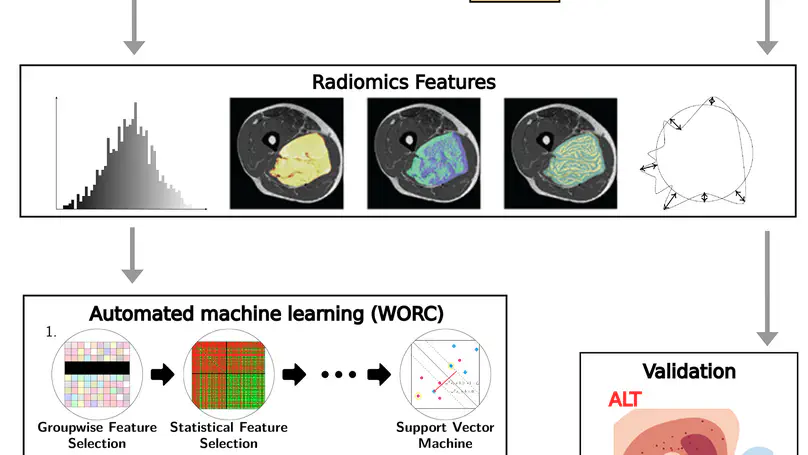
Very proud of the first paper of PhD candidate Douwe Spaanderman! This study externally and prospectively validated a radiomics model for differentiating lipomas from atypical lipomatous tumors (ALTs) on MRI, incorporating automatic and minimally interactive segmentation methods to improve clinical feasibility. The model demonstrated strong diagnostic performance across three large cohorts, achieving AUCs of up to 0.89 and performing comparably to expert radiologists, potentially reducing the need for biopsies.
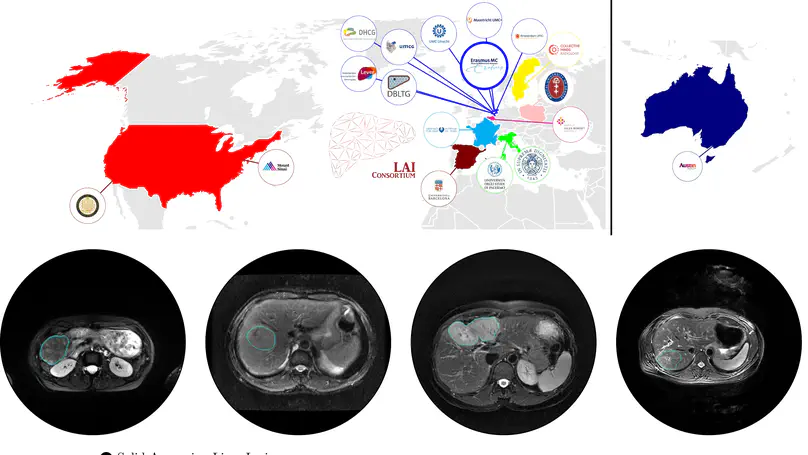
Liver cancer is one the most common cancers worldwide. Magnetic resonance imaging (MRI) plays an important role in its diagnosis, but due to the wide variety of malignant and benign liver lesions, accurate diagnosis can be extremely challenging and highly reader dependent. The Liver Artificial Intelligence (LAI) consortium will develop novel MRI analysis methods to support the diagnosis of liver lesions and thereby improve treatment decisions for the individual patient.
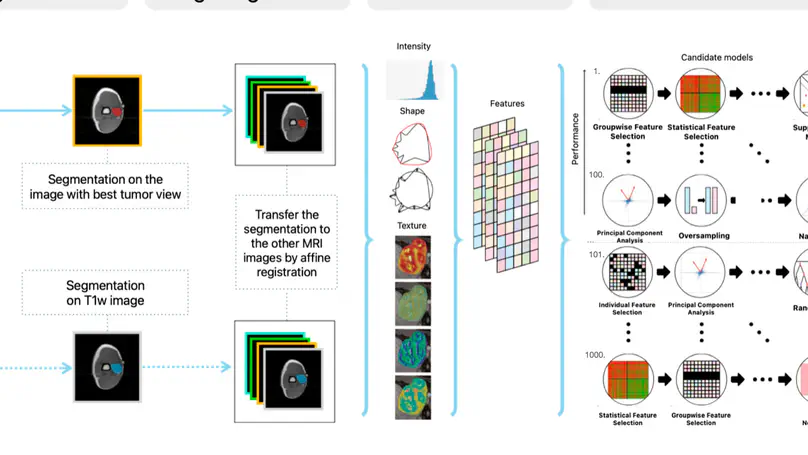
Very proud of the first paper of PhD candidate Xinyi Wan! This study aims to improve the preoperative classification of nerve sheath tumors using radiomics, a method that extracts quantitative data from medical images. By analyzing MRI scans, we seek to develop a more accurate way to distinguish between different types of nerve sheath tumors before surgery. Our findings could lead to better treatment planning and outcomes for patients with these tumors. This research has the potential to enhance the diagnostic process and contribute to more personalized care for individuals with nerve sheath tumors, ultimately benefiting the medical community and patients alike.
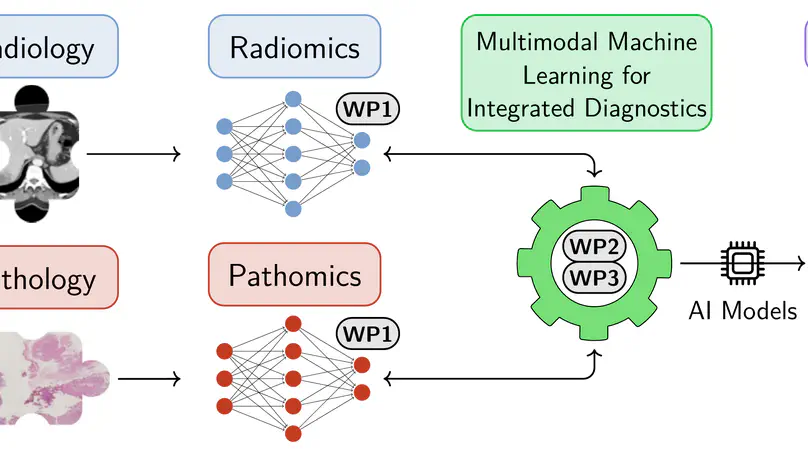
Interview for the Beeldspraak magazine of the department of Radiology and Nuclear Medicine of the Erasmus MC on my new AIID research line.
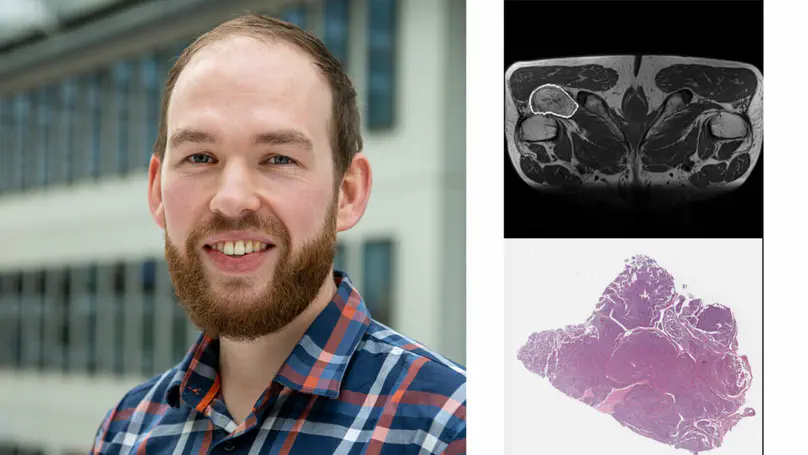
The aim of the AI for Integrated Diagnostics (AIID) research line is to join forces of radiomics and pathomics to create trustworthy models to aid clinicians in decision making. Read more on the project page or the news article on the grant.
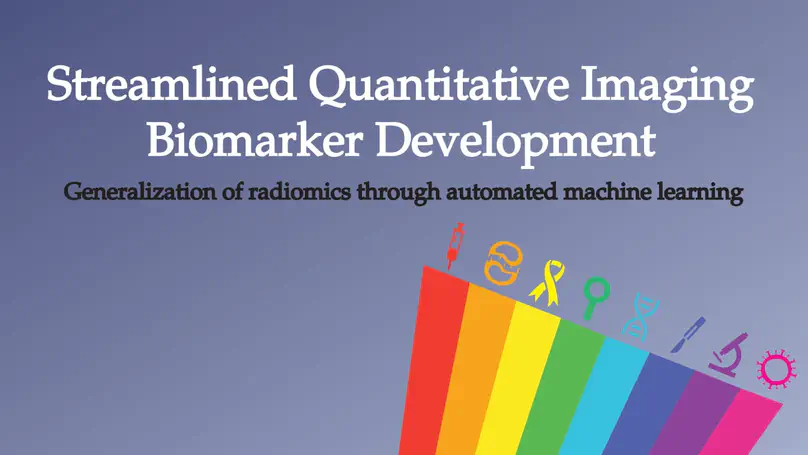
Radiomics uses quantitative medical imaging features and AI to create predictive models which can be used as biomarkers. In this thesis, we have developped an adaptive radiomics framework to automatically optimize the radiomics workflow per application and demonstrate its use to create biomarkers in eight different clinical applications.
Recent Publications
Student Projects
We work on various clinical applications with different clinicians, and various technical solutions within medical image analysis & AI. The projects range from very technical hybrid, to more clinical. There are usually too many projects to describe here. Currently, we do not have any predefined projects available, we expect these to soon be put online, but we always have more than enough ideas, so feel free to contact me for more information if you are interested in an internship / thesis! For an overview of some past projects, please see https://bigr.nl/open-projects/.
*Experience and Education
With a joint appointment at the Radiology & Nuclear and Pathology departments, Martijn is heading the AI for Integrated Diagnostics (AIID) research line. The AIID group develops novel multimodal machine learning methods to develop quantitative biomarkers, focused on medical imaging and application in oncology.
- Collaboration and awards: Martijn is initiator and recipient of various (consortium) grants, including an NWO NGF AINed Perfonal Fellowship (2M), the Liver AI (LAI) consortium (NWO OTP 1M grant), the Sarcoma Artificial Intelligence (SAI) consortium (Hanarth Fonds 400k grant), a Health-Holland 1M TKI grant on incidental pulmonary embolism, and project lead of the Colorectal Liver Metastes AI (COLIMA) consortium (grant in writing). He is also work package leader in the Horizon projects EuCanImage, EOSC4Cancer, and AFRICAI-RI. Across these consortia, 63 clinical centers, companies, and associations from 30 countries are united. He is also external advisor of RadioVal and part of EUCAIM.
- MICCAI Open Data Initiative: Co-founder and co-lead of the MICCAI Open Data initiative, promoting and facilitating medical imaging data sharing. Started at MICCAI 2024 and continued at MICCAI 2025 and MICCAI 2026 as Open Data Chair.
- Trustworthy AI: Co-lead of the FUTURE-AI international guideline for trustworthy and deployable AI in healthcare.
- Supervision: 4 PostDocs, 12 PhD students, and 15 MSc students.
Extending the work of his PhD, Martijn’s research focused on generalization of radiomics biomarkers (conventional and deep learning based) using automated machine learning and meta-learning. He worked on a variety of clinical applications (e.g. sarcoma, liver cancer, colorectal cancer, bladder cancer, melanoma, cardiomyopathy, neuroendocrine tumors, CRPS).
- Management: Co-developer of Imaging Office of department of Radiology and Nuclear Medicine.
- Supervision: 17 MSc students.
- Education: Teaching and continuous development of three courses in the BSc and MSc Technical Medicine
Martijn will visit the group of Prof. Dr. Karim Lekadir to collaborate on AI for oncology and cardiac imaging within the context of the EuCanImage and euCanSHare consortia. While the main focus is on developing novel algorithms for (deep) radiomics, they will also work on federated learning, applying Martijn’s adaptive radiomics framework from his PhD to ``new’’ clinical applications, a second version of the FUTURE-AI guiding principles, and improving the clinical utility of (radiomics) AI tools.
Supervisors: Karim Lekadir
See extended description in the “about” section on this website.
Supervisors: Stefan Klein, Jan-Jaap Visser, Wiro Niessen
- Track: Imaging Physics
- Specialisation: Research & Development
- Thesis: Registration of 3D Breast Ultrasound Scans together with Erasmus Medical Center
- Honours track: Quantum Nanoscience
- Thesis: Activation cycles of stochastically blinking molecules in super-resolution microscopy
Contact
- m.starmans@erasmusmc.nl
- Doctor Molewaterplein 40, Rotterdam, 3015GD
- Department of Radiology & Nuclear Medicine, Room Na-2616
- DM Me
